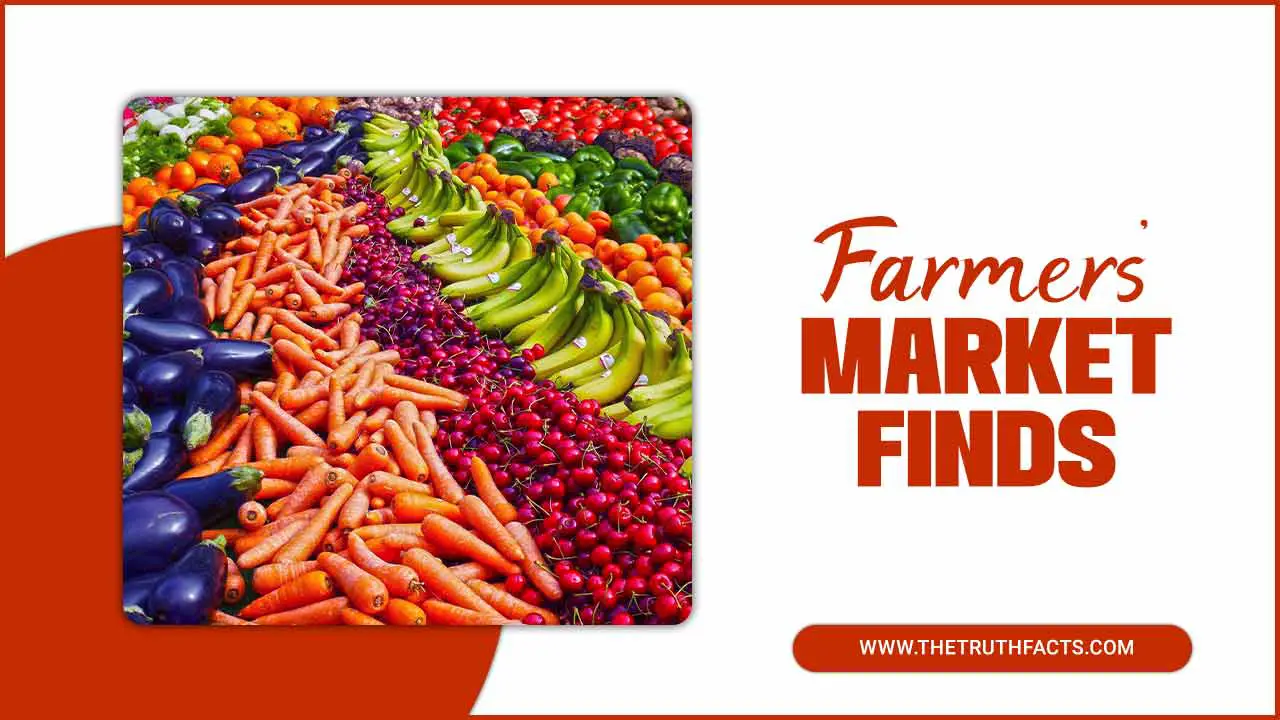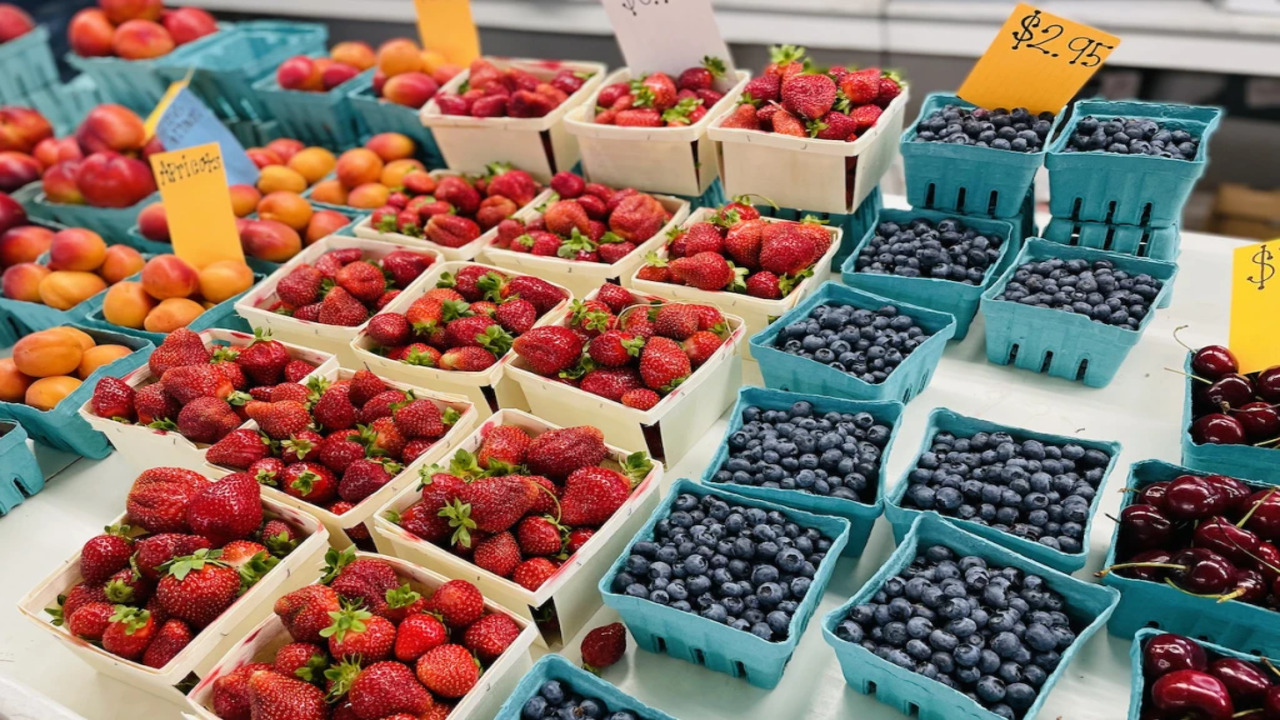Farmers’ Market Finds offers a unique shopping experience for fresh, healthy, locally sourced produce. These markets are typically held outdoors and feature various fruits, vegetables, herbs, and other products such as honey, bread, and handmade crafts.
Farmers’ Market provides access to delicious and nutritious food, supports the local economy, and promotes sustainable agriculture practices. Consumers can feel more connected to their community and the environment by purchasing from these markets.
Additionally, farmers and vendors are often willing to share recipes, cooking tips, and product information, creating a friendly and educational atmosphere. Whether you are a seasoned foodie or someone looking for a fun weekend activity. Farmers’ Markets are a great way to explore the flavors and culture of your area.

The 7 Best Products Farmers’ Market Finds

Farmers’ markets are a great place to shop for fresh, local, and seasonal produce and other products such as honey, eggs, meat, cheese, bread, and more. You can find various items unavailable in most grocery stores and support your local farmers and artisans simultaneously.
Plus, you can enjoy the fun and friendly atmosphere of browsing through different stalls and chatting with vendors and fellow shoppers. Here are some of the best farmers’ market finds you should look for on your next visit.
1. Honey
Honey is one of the most delicious and versatile products you can buy at farmers’ markets. Not only is it a natural sweetener that can be handy in baking, cooking, or tea. But it also has many health benefits, such as soothing sore throats, boosting immunity, and healing wounds.
Local honey is especially good for you, as it can help you fight allergies by exposing you to small amounts of pollen from your area. Depending on the flowers the bees visit, you can also find different flavors of honey at farmers’ markets, such as lavender, orange blossom, clover, or wildflower.
2. Eggs
Eggs are a staple food that can be handy for breakfast, lunch, or dinner. They are also a great source of protein, healthy fats, and various vitamins and minerals.
However, not all eggs are created equal. Eggs from free-range chickens fed a natural diet are healthier and tastier than eggs from factory-farmed chickens kept in cages and fed antibiotics and hormones. Free-range eggs have more omega-3 fatty acids, vitamin A, vitamin E, and beta carotene than conventional eggs. They also have brighter yolks and firmer whites that make them more appealing.
3. Grass-Fed Beef
If you are a meat lover, you should definitely try grass-fed beef from farmers’ markets. Grass-fed beef comes from cattle raised on pasture and eating grass instead of grains. This makes their meat leaner, more flavorful, and more nutritious than grain-fed beef.
Grass-fed beef has less fat and calories than grain-fed beef but more omega-3 fatty acids, conjugated linoleic acid (CLA), vitamin B12, iron, zinc, and antioxidants. These nutrients can help lower your risk of heart disease, diabetes, cancer, and obesity.
4. Grapes

Grapes are sweet and juicy fruit that can be eaten fresh or handy to make wine, juice, jam, or vinegar. They are also rich in antioxidants, fiber, vitamin C, and potassium. However, not all grapes are the same. The grapes you find at farmers’ markets are usually smaller and more flavorful than those at grocery stores.
They may also have seeds, which add more crunch and nutrition to the fruit. Some varieties at farmers’ markets include Concord grapes, which have a deep purple color and a tangy taste. Muscadine grapes have a thick skin and a musky aroma, or champagne grapes, which have tiny clusters of sweet berries.
5. Tomatoes

Tomatoes are one of the most popular vegetables (or fruits) you can buy at farmers’ markets. They come in many shapes, sizes, colors, and flavors that suit any dish or palate. Tomatoes also pack with lycopene, vitamin C, vitamin A, potassium, and other phytochemicals that can protect your skin, eyesight, heart, and immune system.
Some varieties at farmers’ markets include Roma tomatoes, which have a plum shape and a meaty texture. Beefsteak tomatoes have a large size and juicy flesh; grape tomatoes have a small size and a sweet taste. Or heirloom tomatoes, which have an irregular shape and a rich flavor.
6. Carrots

Carrots are crunchy and colorful root vegetables that can be eaten raw or cooked. They are also a good source of beta carotene, vitamin A, vitamin K, fiber, and other antioxidants that can improve your vision, skin, bones, and digestion. However, carrots are not only orange. You can find carrots in different colors at farmers’ markets, such as purple, yellow, white, or red.
These carrots have different tastes and nutrients than orange carrots. For example, purple carrots have more anthocyanins, which can reduce inflammation and prevent cancer. Yellow carrots have more lutein, which can protect your eyes and brain. White carrots have more phytochemicals, boosting your immunity and detoxifying your body. Red carrots have more lycopene, lowering your blood pressure and cholesterol.
7. Bread
Bread is a staple food that can eat with any meal or snack. It is also a great source of carbohydrates, fiber, protein, and B vitamins that can provide energy and satiety. However, not all breads are the same. The farmers’ market bread usually comes with fresh and natural ingredients, such as whole grains, nuts, seeds, fruits, or herbs.
They are also baked with traditional methods, such as sourdough, which gives them a unique flavor and texture. Some of the breads that you can find at farmers’ markets include rye bread, which has a dark color and a dense crumb. Multigrain bread, which has a variety of grains and seeds. Banana bread, which has a moist and sweet taste; or focaccia bread, which has a flat shape and a savory topping.
Conclusion
Farmers’ Market is a great way to support local farmers and enjoy fresh, seasonal produce. By shopping at farmers’ markets, consumers can access various fruits, vegetables, and other products that may not be available at grocery stores.
In addition, farmers’ markets often offer a sense of community and a chance to interact with the people who grow the food we eat. Supporting local farmers can also positively impact the environment by reducing the carbon footprint associated with shipping food long distances.
Farmers’ Market Finds offers a unique and rewarding shopping experience that benefits consumers and farmers alike. Whether a seasoned shopper or a first-timer, visiting a farmers’ market is a great way to connect with your community and enjoy fresh, locally-grown food.
Faq’s:
1.Where Can I Find The Farmers’ Market?
Ans: Farmers’ Market can discover at local farmers’ markets in your community or nearby areas. These markets are often organized on specific days of the week and provide a platform for local producers to sell their goods directly to consumers.
2.What Kind Of Products Can I Expect To Find At Farmers’ Market?
Ans: Farmers’ Market offers diverse products, including seasonal fruits and vegetables, organic meats, artisanal cheeses, homemade preserves, freshly baked goods, handcrafted jewelry, natural skincare products, and much more.
3.Are Farmers’ Market More Expensive Than Store-Bought Products?
Ans: Prices at Farmers’ Market can vary depending on the product and location. While some items may be competitively priced, others may be slightly higher due to organic farming practices, limited availability, and supporting local producers.
4.Are Farmers’ Markets Organic?
Ans: Many Farmers’ markets offer organic options; however, not all products are certified organic. It’s best to inquire with the vendors directly about their farming practices and certifications to ensure you get the desired products.
5.Can I Negotiate Prices At Farmers’ Market?
Ans: Negotiating prices at Farmers’ Markets may not always be common practice. However, building a rapport with vendors and purchasing in bulk or toward the end of the market day may provide opportunities for some flexibility.

I’m a writer and blogger who loves to talk about entertainment, culture, and relationships. I love to share my thoughts and insights on these topics, and I’m always looking for new ways to engage with my readers. I’m also a big fan of learning new things, so I’m always exploring new areas of interest.
